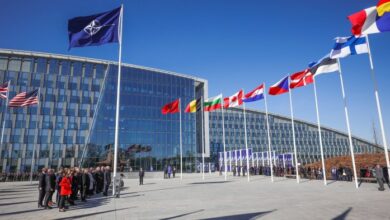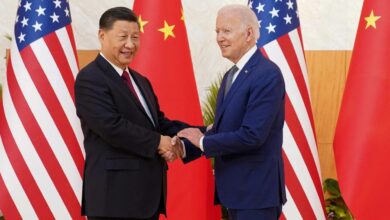
War on Terror Geopolitics: Shaping the World
War on Terror Geopolitics: Shaping the World delves into the complex and far-reaching consequences of the global “War on Terror,” examining its historical roots, key players, and enduring impact on the world stage. From the events that triggered this era to the geopolitical shifts it catalyzed, this exploration offers a nuanced understanding of the “War on Terror’s” profound influence on international relations, political landscapes, and societal dynamics.
This blog post examines the intricate web of alliances and conflicts that emerged in response to the “War on Terror,” exploring the motivations and objectives of key players, including both states and non-state actors. We’ll dissect the geographic impact of this global struggle, delving into the regions most affected by conflict and the enduring legacies of military interventions.
The post will also scrutinize the political, social, economic, and ethical implications of the “War on Terror,” analyzing its impact on governance, human rights, development, and the delicate balance between security and freedom.
Historical Context
The “War on Terror” is a multifaceted phenomenon with deep historical roots and far-reaching consequences. Understanding its origins and the geopolitical landscape that shaped it is crucial for grasping its impact on global politics. This exploration delves into the events leading up to the declaration of the “War on Terror,” analyzing the key figures and events that contributed to its rise and its enduring influence on the world.
The Rise of Islamic Extremism
The emergence of Islamic extremism is a complex phenomenon with diverse contributing factors. The rise of radical Islamist groups like al-Qaeda, responsible for the 9/11 attacks, can be traced back to various historical events and social trends.
- The Soviet-Afghan War (1979-1989):The Soviet invasion of Afghanistan in 1979 sparked a resistance movement fueled by the West, which provided support to Afghan mujahideen, including individuals who would later become prominent figures in al-Qaeda. This war served as a training ground for many future jihadists and fostered anti-Western sentiment.
- The First Gulf War (1991):The US-led coalition’s intervention in the Gulf War, aimed at liberating Kuwait from Iraqi occupation, further fueled anti-Western sentiment in the Middle East. Many Muslims perceived the war as an attack on Islam and saw the US as a colonial power seeking to control the region’s resources.
- The Palestinian-Israeli Conflict:The ongoing conflict between Israel and Palestine has been a significant source of tension and resentment in the Middle East. The perception of Israeli actions as unjust and oppressive has fueled support for militant groups, including those espousing extremist ideologies.
- Social and Economic Discontent:Poverty, unemployment, and lack of opportunity in many Muslim-majority countries have contributed to the appeal of extremist ideologies. These ideologies offer a sense of purpose, identity, and belonging to individuals who feel marginalized and disenfranchised.
The 9/11 Attacks and the Declaration of the “War on Terror”
The September 11, 2001, attacks on the World Trade Center and the Pentagon in New York City and Washington, D.C., marked a turning point in global politics. The attacks, carried out by al-Qaeda, a militant Islamist group led by Osama bin Laden, prompted the US to launch a global “War on Terror.”
- The “War on Terror” Declaration:In response to the 9/11 attacks, President George W. Bush declared a “War on Terror” against al-Qaeda and its allies, vowing to “hunt down” terrorists and dismantle their networks. This declaration marked a shift in US foreign policy, emphasizing preemptive action and military intervention in the fight against terrorism.
- The Invasion of Afghanistan:The US, along with its allies, invaded Afghanistan in October 2001, targeting al-Qaeda and its Taliban allies, who had provided sanctuary to the group. The invasion aimed to dismantle al-Qaeda’s infrastructure and prevent future terrorist attacks.
- The Invasion of Iraq:The US invasion of Iraq in 2003, based on the claim that Saddam Hussein’s regime possessed weapons of mass destruction, was also framed as part of the “War on Terror.” The invasion, however, was highly controversial and led to a protracted and costly conflict that destabilized the region and contributed to the rise of new extremist groups like ISIS.
The War on Terror has reshaped global geopolitics, but it’s also had a chilling effect on the free flow of information. We see this in the increasing pressure on journalists, who are often targeted for exposing uncomfortable truths about power structures and the machinations of war.
This has led to a dangerous trend, what some call the war on journalism , where the press is silenced or intimidated, making it harder to hold those in power accountable. This trend has serious consequences for understanding the complexities of the War on Terror and the potential for long-term peace.
Key Players and Alliances
The “War on Terror” involved a complex web of actors, both state and non-state, with shifting alliances and motivations. Understanding the key players and their strategic goals is crucial for comprehending the geopolitical dynamics of this protracted conflict.
States and Their Alliances
The “War on Terror” fundamentally reshaped global alliances, with the United States leading a coalition of nations in response to the 9/11 attacks.
- The United States, as the primary target of the attacks, launched a global campaign against terrorism, targeting al-Qaeda and its affiliates. It formed the “Coalition of the Willing,” bringing together a diverse group of nations including the United Kingdom, Australia, Canada, and several European countries.
The “war on terror” had a profound impact on the geopolitical landscape, and its consequences continue to reverberate today. One of the most significant and enduring legacies of this conflict is the aftermath and rebuilding of Iraq, a country that was deeply affected by the invasion and subsequent occupation.
To truly understand the complexities of this region, it’s essential to examine the challenges and successes of the reconstruction efforts in Iraq, as documented in this insightful article: aftermath and rebuilding iraq. The lessons learned from Iraq’s experience have shaped our understanding of post-conflict reconstruction and the delicate balance between military intervention and long-term stability.
These nations provided military support, intelligence sharing, and logistical assistance to the US-led operations in Afghanistan and Iraq.
- NATO, under Article 5 of its charter, invoked collective defense for the first time in its history, activating its response mechanism to support the United States in its counterterrorism efforts. This marked a significant expansion of NATO’s role beyond its traditional focus on European security.
- Other countries, like Russia and China, while not formally joining the US-led coalition, have cooperated in specific areas, such as counterterrorism intelligence sharing. However, their interests often diverged from those of the United States, leading to tensions and strategic complexities.
Non-State Actors, War on terror geopolitics
Non-state actors, including terrorist organizations and extremist groups, played a significant role in shaping the “War on Terror.”
- Al-Qaeda, led by Osama bin Laden, emerged as the primary antagonist in the early stages of the “War on Terror.” The organization’s ideology of global jihad, targeting the United States and its allies, fueled the conflict and inspired other terrorist groups.
- The Islamic State of Iraq and Syria (ISIS), a splinter group of al-Qaeda, gained prominence in the aftermath of the US withdrawal from Iraq in 2011. ISIS’s brutal tactics and territorial expansion in Iraq and Syria further intensified the conflict and attracted foreign fighters from across the globe.
- Other terrorist groups, such as Boko Haram in Nigeria, al-Shabaab in Somalia, and the Taliban in Afghanistan, have exploited the instability created by the “War on Terror” to expand their influence and conduct attacks within their respective regions.
Motivations and Objectives
The motivations and objectives of the key players in the “War on Terror” were diverse and often intertwined.
- The United States sought to dismantle terrorist networks, prevent future attacks, and promote democracy and stability in the Middle East. However, its military interventions in Afghanistan and Iraq, as well as its use of drone strikes and other counterterrorism tactics, have been criticized for fueling instability and creating new security threats.
- Terrorist organizations like al-Qaeda and ISIS aimed to overthrow existing governments, establish their own Islamic states, and wage a global jihad against the West. Their objectives have often been driven by a mixture of religious extremism, political grievances, and a desire for revenge.
- Other states, such as Russia and China, have sought to advance their own strategic interests in the region, often in opposition to the United States. Russia, for example, has intervened in Syria to support the government of Bashar al-Assad, while China has invested heavily in infrastructure projects in the Middle East, seeking to expand its economic and political influence.
Conflicts of Interest
The “War on Terror” has been characterized by significant conflicts of interest among the key players.
- The United States and its allies have often clashed with other states, such as Russia and China, over their respective strategies for dealing with terrorism and the future of the Middle East.
- Different factions within the US government have also disagreed on the best way to combat terrorism, with some advocating for a more aggressive military approach and others emphasizing the importance of diplomacy and development.
- The “War on Terror” has also created tensions between the West and the Muslim world, with many Muslims feeling alienated by the US-led military interventions in the Middle East and the perception of Islamophobia in the West.
Geographic Impact and Conflicts: War On Terror Geopolitics
The “War on Terror” has had a profound geographic impact, primarily concentrated in the Middle East, Central Asia, and parts of Africa. These regions have become the battlegrounds for military interventions, counterterrorism operations, and the rise of extremist groups, significantly altering the geopolitical landscape.
Major Military Interventions and Conflicts
The “War on Terror” has witnessed numerous military interventions and conflicts, shaping the geopolitical landscape of affected regions. These interventions have had both short-term and long-term consequences, impacting the political, social, and economic fabric of these areas.
- The War in Afghanistan (2001-2021):The US-led invasion of Afghanistan following the 9/11 attacks marked the beginning of the “War on Terror.” The primary objective was to dismantle al-Qaeda, which had used Afghanistan as a base of operations. The war lasted for two decades and involved a complex web of alliances, shifting objectives, and significant civilian casualties.
- The Iraq War (2003-2011):The US-led invasion of Iraq in 2003 was based on the assumption that Saddam Hussein’s regime possessed weapons of mass destruction and was linked to al-Qaeda. While no weapons of mass destruction were found, the invasion led to a protracted conflict, sectarian violence, and the rise of the Islamic State of Iraq and Syria (ISIS).
- The War in Libya (2011):The NATO-led intervention in Libya in 2011, aimed at removing Muammar Gaddafi from power, resulted in the overthrow of his regime. However, the intervention also contributed to the destabilization of the country, leading to a power vacuum and the rise of various armed factions.
- The War in Syria (2011-present):The Syrian Civil War, triggered by the Arab Spring uprisings, has become a complex and multi-faceted conflict involving numerous actors, including the Syrian government, various rebel groups, ISIS, and foreign powers. The war has resulted in a humanitarian catastrophe, with millions of refugees displaced and the country facing a deep political and economic crisis.
- The War in Yemen (2014-present):The ongoing conflict in Yemen, involving the Yemeni government, Houthi rebels, and a Saudi-led coalition, has resulted in a devastating humanitarian crisis. The war has also created a breeding ground for extremist groups, including al-Qaeda and ISIS.
Political and Social Consequences

The “War on Terror” has had profound and far-reaching political and social consequences, shaping global governance, human rights, and social fabric in ways that continue to be debated and analyzed. These consequences have manifested in various forms, from the rise of authoritarianism and the erosion of civil liberties to the exacerbation of existing social divisions and the emergence of new forms of prejudice and discrimination.
Changes in Governance and Human Rights
The “War on Terror” has significantly impacted governance and human rights worldwide. The rhetoric of “fighting terrorism” has often been used to justify increased surveillance, restrictions on civil liberties, and the expansion of executive powers.
- Expansion of Surveillance Powers:Governments have invoked the “War on Terror” to justify the expansion of surveillance programs, often without adequate oversight or judicial review. This has raised concerns about the erosion of privacy and the potential for abuse of power. Examples include the Patriot Act in the United States, which broadened the government’s surveillance powers, and the use of mass surveillance programs like PRISM.
The “war on terror” has reshaped global alliances and fueled a complex web of geopolitical tensions. One chilling reminder of the unpredictable nature of this conflict is the story of an Iranian agent who reportedly warned the US of an impending al-Qaeda attack, as detailed in this article.
This incident highlights the intricate and often surprising dynamics at play in the ongoing fight against terrorism, and the need for careful consideration of all potential allies in this global struggle.
- Restrictions on Civil Liberties:In the name of security, many governments have implemented measures that restrict civil liberties, such as limitations on freedom of speech, assembly, and the press. These restrictions have often been justified on the grounds of preventing terrorism, but they have also been used to suppress dissent and political opposition.
- Extrajudicial Detention and Torture:The “War on Terror” has also been associated with the use of extrajudicial detention and torture. The practice of “rendition,” where individuals suspected of terrorism are transferred to countries with less stringent human rights standards, has been widely criticized.
The use of torture, such as waterboarding, has also been a major point of controversy, with accusations of human rights violations and abuses of power.
- Erosion of Democratic Principles:The “War on Terror” has contributed to the erosion of democratic principles in some countries. The focus on security has led to the curtailment of checks and balances, the weakening of independent institutions, and the concentration of power in the hands of the executive branch.
Economic and Development Implications
The “War on Terror” has had profound economic and development implications, shaping the global landscape in ways that continue to be felt today. The costs of military interventions, the impact on global trade and investment, and the consequences for humanitarian aid, infrastructure, and education are all significant aspects of this complex issue.
Economic Costs of Military Interventions
The “War on Terror” has been marked by extensive military interventions, primarily in Afghanistan and Iraq. These interventions have resulted in substantial economic costs, including:
- Direct military spending:The United States alone has spent trillions of dollars on military operations, equipment, and personnel related to the “War on Terror.” The costs have been borne by taxpayers, leading to increased national debt and potentially diverting resources from other critical areas like education and healthcare.
- Indirect costs:Beyond direct military spending, there are significant indirect costs associated with the “War on Terror,” including:
- Reconstruction and development:The destruction caused by conflict necessitates substantial investments in rebuilding infrastructure, providing humanitarian aid, and supporting economic recovery.
- Security costs:Increased security measures, including border patrols, surveillance, and intelligence gathering, contribute to the overall economic burden.
- Economic disruption:Conflict and instability can disrupt economic activity, leading to job losses, reduced investment, and a decline in trade.
Impact on Global Trade and Investment
The “War on Terror” has had a significant impact on global trade and investment, creating both opportunities and challenges.
- Increased security measures:Security concerns have led to stricter border controls, increased inspections, and more complex customs procedures, adding costs and delays to global trade.
- Risk aversion:Investors may be hesitant to invest in countries perceived as unstable or risky, leading to reduced capital flows and slower economic growth.
- Trade diversion:The “War on Terror” has led to some trade diversion, with businesses shifting operations to countries perceived as more stable and secure.
Development Implications
The “War on Terror” has had a significant impact on development efforts, particularly in regions affected by conflict.
- Humanitarian aid:The “War on Terror” has increased the need for humanitarian aid to address the suffering caused by conflict, displacement, and poverty. However, the complex security environment and political instability can make it difficult to deliver aid effectively.
- Infrastructure development:Conflict often destroys infrastructure, hindering economic development and access to essential services.
Rebuilding infrastructure requires substantial resources and can be a long and challenging process.
- Education:Conflict can disrupt education systems, leading to a loss of human capital and hindering long-term development. The “War on Terror” has exacerbated this problem in many regions.
Role of International Organizations and Development Agencies
International organizations and development agencies have played a crucial role in addressing the economic and development challenges associated with the “War on Terror.”
- United Nations:The UN has been involved in peacebuilding, humanitarian aid, and development efforts in conflict-affected regions.
- World Bank:The World Bank has provided financial assistance and technical support for reconstruction and development efforts in countries affected by the “War on Terror.”
- International Monetary Fund (IMF):The IMF has provided financial assistance and policy advice to countries facing economic difficulties related to the “War on Terror.”
Legal and Ethical Considerations
The “War on Terror” has been marked by significant legal and ethical challenges, raising complex questions about the balance between security and human rights. This section delves into the key considerations, examining the use of controversial tactics and the role of international law.
The Use of Torture
The use of torture in the context of the “War on Terror” has been a highly contentious issue. While torture is universally condemned under international law, including the UN Convention Against Torture, some countries have argued that it is necessary to obtain information from suspected terrorists.
- The use of “enhanced interrogation techniques” by the US government in the aftermath of 9/11, including waterboarding, sleep deprivation, and stress positions, sparked widespread condemnation and legal challenges. These practices were deemed illegal under the Convention Against Torture and the Geneva Conventions.
- The “ticking time bomb” scenario, which posits that torture may be justified to prevent an imminent terrorist attack, has been used as an argument in favor of torture. However, this argument is highly contested, as it raises ethical concerns about the potential for false confessions and the slippery slope towards widespread abuse.
Targeted Killings
Targeted killings, the deliberate killing of individuals deemed to be a threat to national security, have become a common tactic in the “War on Terror.” This practice has raised serious ethical and legal concerns, particularly regarding the lack of due process and the potential for collateral damage.
- The legality of targeted killings under international law is contested. While some argue that they may be justified under certain circumstances, such as self-defense, others contend that they violate the right to life and due process.
- The use of drones in targeted killings has been particularly controversial. Drones allow for strikes to be carried out with minimal risk to the attacking forces, but they also raise concerns about the potential for civilian casualties and the lack of transparency in the decision-making process.
Surveillance
The “War on Terror” has led to an unprecedented expansion of government surveillance powers. Governments have argued that increased surveillance is necessary to prevent terrorist attacks, but this has come at the expense of individual privacy and civil liberties.
- The use of mass surveillance programs, such as the US National Security Agency’s (NSA) PRISM program, has raised concerns about the potential for government overreach and the erosion of privacy rights.
- The Snowden revelations, which exposed the extent of the NSA’s surveillance activities, sparked widespread debate about the balance between security and privacy.
International Law and Human Rights
International law and human rights play a crucial role in shaping the response to the “War on Terror.” The principles of international law, such as the prohibition of torture, the right to life, and the right to a fair trial, provide a framework for holding states accountable for their actions.
- The International Criminal Court (ICC) has jurisdiction over crimes against humanity, war crimes, and genocide, and has played a role in investigating alleged abuses committed in the context of the “War on Terror.”
- Human rights organizations have been instrumental in documenting and exposing human rights abuses committed in the name of the “War on Terror.”
Balancing Security Concerns with Ethical Considerations
Balancing security concerns with ethical considerations in the context of the “War on Terror” is a complex and challenging task. States are faced with the difficult choice of how to protect their citizens from terrorism while upholding human rights and international law.
- The “War on Terror” has highlighted the need for a nuanced approach to counterterrorism that balances security concerns with ethical considerations.
- It is crucial to ensure that counterterrorism measures are proportionate to the threat and that they do not violate fundamental human rights.
Future Prospects and Implications
Predicting the future of the “War on Terror” is a complex endeavor, riddled with uncertainties and subject to constant evolution. However, analyzing current trends and historical patterns can help us envision potential scenarios and their implications for global politics. This section explores potential future developments, challenges, and opportunities for achieving lasting peace and security, along with recommendations for policymakers and international organizations to address the long-term consequences of the “War on Terror.”
Potential Future Developments
The future of the “War on Terror” is likely to be characterized by a shifting landscape of threats and challenges. The rise of new terrorist groups, the proliferation of extremist ideologies online, and the potential for state-sponsored terrorism pose significant risks.
Additionally, the evolving nature of conflict, including the use of cyberwarfare and the rise of hybrid warfare, will further complicate the security environment.
- Emergence of New Terrorist Groups:The decline of established terrorist organizations like Al-Qaeda does not necessarily signal the end of terrorism. New groups may emerge, adapting to changing circumstances and exploiting vulnerabilities in existing security frameworks. The rise of ISIS and its affiliates, as well as the increasing presence of regional terrorist groups in Africa and Southeast Asia, illustrates this trend.
- Proliferation of Extremist Ideologies Online:The internet has become a powerful tool for extremist groups to spread their ideologies, recruit members, and coordinate attacks. The ease of access to online platforms and the anonymity they offer make it difficult to monitor and counter the spread of extremist propaganda.
- State-Sponsored Terrorism:The involvement of state actors in supporting or sponsoring terrorist activities remains a serious concern. This can take various forms, including providing financial support, training, or safe havens to terrorist groups. The ongoing conflicts in Syria and Yemen highlight the dangers of state-sponsored terrorism.
- Evolving Nature of Conflict:The traditional model of warfare is being challenged by the rise of new technologies and tactics. Cyberwarfare, hybrid warfare, and the use of drones are becoming increasingly prevalent, blurring the lines between traditional warfare and terrorism. This evolution presents new challenges for security forces and policymakers.






